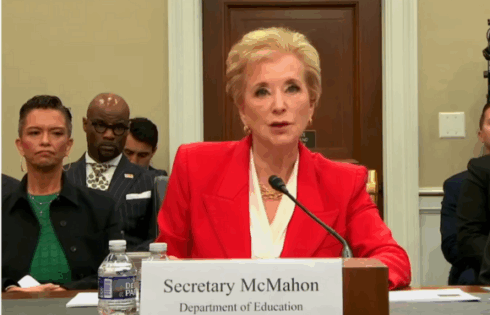
The Society for Evidence Based Gender Medicine recently released a critical appraisal of a highly publicized article in the American Medical Association journal, JAMA Surgery, that claimed there is long-term satisfaction among patients who underwent a gender-affirming mastectomy.
The study, published in August, found biological women who removed their breasts through a mastectomy to have a more male-looking chest reported high rates of satisfaction longterm, however the society highlighted numerous flaws in the research.
While the study is touted as “longterm,” most of the top surgeries only took place about three-and-a-half years ago, the society pointed out.
What’s more, only 139 responded to the survey among 235 patients. Those who did not respond are more likely to have regretted their decision, and high nonparticipation rates threaten the validity of the findings, the society argued.
Researchers touted the fact that these non-respondents never went back to reverse their procedure at the same hospital, but patients unhappy with their decision “are unlikely to return to the same clinicians who treated them originally,” the society argued.
“Further,” the group added, “not all those who regret mastectomy will seek another invasive surgery.” Others, they noted, may choose not to get the procedure reversed due to lack of insurance coverage or masculinizing mastectomies not truly being “reversible,” as normal functioning cannot be restored to the breasts.
The College Fix reached out to Megan Lane, the corresponding and co-senior author of the initial study and a resident in the integrated Plastic and Reconstructive Surgery program at Michigan Medicine, asking if she would comment on the criticisms put forth in the Society for Evidence Based Gender Medicine’s critical appraisal of her work.
Valerie Goodwin, a public relations representative for University of Michigan Health, Michigan Medicine, replied, “Unfortunately, Dr. Lane is no longer responding to media inquiries at this time.”
Goodwin then went on to direct The Fix to a brief summary of an article she wrote for the Michigan Medicine website. Goodwin’s summary did not address the concerns raised in the Society for Evidence Based Gender Medicine’s critical appraisal.
The society describes itself on its website as “an international group of over 100 clinicians and researchers concerned about the lack of quality evidence for the use of hormonal and surgical interventions as first-line treatment for young people with gender dysphoria. We represent expertise from a range of clinical disciplines.”
The claim of low mastectomy regret is another example of a growing trend of prestigious medical journals serving as “platforms for promoting misleading, politically motivated research that aims to apply a veneer of misplaced confidence in highly invasive, irreversible treatment,” the society argued.
“The study authors lauded the ‘overwhelmingly low levels of regret following gender-affirming surgery,’ and framed their findings as in conflict with the ‘increasing legislative interest in regulating gender-affirming surgery,’ referring to current legislative attempts to restrict or ban ‘gender-affirming’ procedures for minors,” SEGM wrote.
Yet, SEGM noted, given that all the survey data analyzed for the study came from adults, it is inappropriate “to leverage the results of the study…to advocate for a policy concerning minors.”
In the initial JAMA Surgery article, Lane and several other researchers from the University of Michigan and the Seattle Children’s Hospital sought to inform ongoing debates regarding the provision and regulation of gender affirming care, which they claim is essential for many individuals experiencing gender dysphoria but also raises concerns among patients, physicians, and policy makers due to the potential irreversibility of some procedures.
To investigate the validity of these concerns, the researchers contacted patients who underwent gender affirming mastectomies between January 1, 1990 and February 29, 2020 at a single U.S. referral center, requesting that they fill out surveys regarding their satisfaction and regret with their decisions to undergo the procedure.
The researchers reported that upon assessing the survey responses, those that agreed to participate in the study experienced overwhelmingly high levels of satisfaction with their procedures and low levels of regret.
Bolstering their findings of self-reported high satisfaction and low regret among gender affirming mastectomy patients, the authors noted, approximately 25 percent of respondents and 23 percent of non-respondents underwent additional gender affirming procedures following mastectomy and none underwent a reversal procedure at the institution at which they had the initial procedure.
“These results,” the researchers stated, “suggest sustained intent and consistency in decision-making.”
In addition to alleging that the authors of the JAMA Surgery article misrepresented their findings as long-term and with applicability to children, SEGM also claimed the study contained several other flaws.
These included not only a high non-response rate by eligible participants and an inability to determine whether non-respondents sought a reversal procedure at another institution, but a failure to compare gender dysphoric individuals who underwent a gender affirming mastectomy to similar individuals who received other treatments such as therapy or psychotropic drugs without surgery.
Many in the media, following the release of the initial JAMA Surgery article, appeared not to share these concerns, even if they generally include a few lines regarding the limitations of the study in their coverage.
“Few Regret Undergoing Gender-Affirming Mastectomies,” declared U.S. News & World Report.
“Transgender and nonbinary patients have no regrets about top surgery, small study finds,” proclaimed CNN.
“Low Regret, High Satisfaction Long Term After Gender-Affirming Mastectomy,” announced MedPage Today.
“Gender-Affirming Mastectomies Have An ‘Overwhelmingly Low’ Regret Rate,” asserted IFL Science.
MORE: Med schools ‘transforming medicine into political advocacy’: analysis
IMAGE: Sandra van der Steen / Shutterstock
Like The College Fix on Facebook / Follow us on Twitter






Please join the conversation about our stories on Facebook, Twitter, Instagram, Reddit, MeWe, Rumble, Gab, Minds and Gettr.